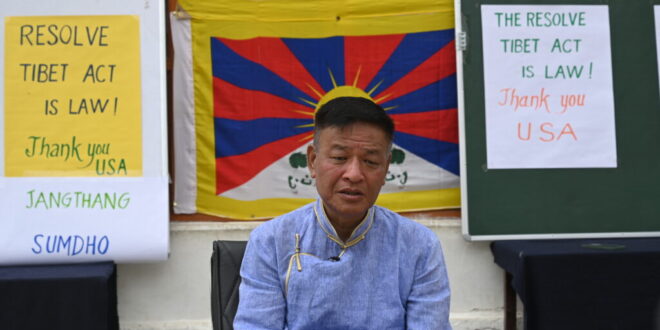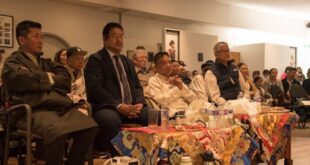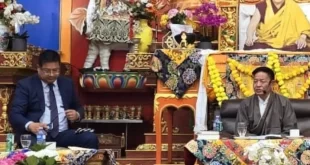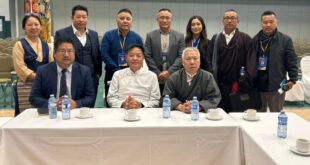Dharamshala: Sikyong Penpa Tsering, who is currently on an official visit to Tibetan nomadic settlements in Jangthang (Ladakh), addressed the media this morning from Jangthang Sumdho to extend his heartfelt gratitude to all the people involved in introducing, advancing, and translating the Resolve Tibet Act into the law of United States.
“Just this morning, when I woke up at Sumdo in Ladakh, one of the nomadic settlements here, I was woken up with this good news that President Joe Biden has signed the Resolve Tibet Act into law this morning, which is 13th of July in India and 12th of July in the United States. I want to take this opportunity to thank President Joe Biden for signing this into law and also want to thank Congressman McCaul, Chairman of the Foreign Affairs Committee, and Congressman Jim McGovern for moving this into the House and getting it through the House, through the Committee, and through the floor. And, I also want to thank Senator Todd Young from the Republican side and Senator Jeff Merkley from the Democrats side, and also the Chairman of the Senate Foreign Relations Committee, Senator Ben Cardin, for all their support in getting it through the Senate Committee and also the Senate floor with unanimity.
This is a shift in US policy on Tibet and how to resolve the Sino-Tibet conflict or dispute, as it is mentioned in the law. The law is important for us in the sense that the US is the only country that has a law on Tibet since 2002 that has been amended through the US Tibet Support and Policy Act of 2020. In between, there was also another law that was passed called the Reciprocal Access to Tibet Act (RATA). This is the fourth in line, and it is very important politically for us because this Act or the law talks about Tibet being an unresolved issue, and in future, if the Sino-Tibet dispute needs to be resolved, then it has to be resolved under international law. The law also talks about the Tibetan people’s right to self-determination, which is there in international law. The law also talks about not accepting China’s propaganda or China’s assertion that Tibet has been part of China since ancient times, which the United States does not recognise, and His Holiness has also not recognised.
This particular provision talks about countering China’s false information or false narrative on Tibetan history, and on its people, institutions, and His Holiness the Dalai Lama. The last part of this Act also talks about the territory of Tibet, which does not restrict only the Tibet Autonomous Region, which is being defined by China as Tibet, and they have now renamed it as Xizang. But, the law says that not only the Tibet Autonomous Region, but regions outside the Tibet Autonomous Region, like the Qinghai Province, Sichuan Province, and also Gansu and Yunnan, are part of Tibet. So this is a new shift in U.S. policy on Tibet. I think it has been interpreted by, of course, understood by different watchers, China watchers and Tibet watchers, in different ways. For us, it’s a new tool. Now we have to start working with a lot of other like-minded countries alongside the U.S. government to convince them to take similar positions that the U.S. government has taken.
I know for a fact that some of the people are quite worried or concerned about part of the statement that came out of the White House after President Biden signed it into a law that mentions about the United States’ stated position of Tibet Autonomous Region and other parts of Tibet being part of China. That does not negatively impact the law, because the law is mainly to talk about the historical status of Tibet as an independent state. So, I hope people will not misunderstand this. They will take it in the right spirit. It does not affect the law in any sense. Of course, there is a lot of tension between U.S.-China relations, and there are things that the U.S. government has to address. So we have to take all those into consideration as well when we work internationally. Thank you, everybody.
A lot of people have put in a lot of effort. It’s not only the congressmen and women who supported the bill, both in the House and the Senate, both from the Democrats and the Republican side. There has been a lot of effort also from our side in the form of the strategy that came out of the CTA since April 2022. And this has been in the works for the last two years and two months. The leadership in the Office of Tibet and the Department of Information and International Relations have been very inspiring. In this case, Representative Namgyal Choedup has played a key role in this. The leadership in the international campaign for Tibet, particularly Richard Gere, who is a very good friend, old friend, he has made it a point to come with us and lobby at the Hill every time. I visited the United States, I visited there six times. Four times he was with us. One time he was physically not able to join us, but he joined us online. And I want to thank Richard la for all your support and help and guidance in pushing this bill forward. And the leadership in the ICT led by President Tenchoe la, Bhuchung la, Franz and friends, all of whom have worked very, very hard to get this through over the last two years and two months. And amply supported by Tibet lobbyists, the young Tibetans who have been to Washington over many years, and particularly this year on March 11th and 12th, there were more than 200 Tibetans lobbying at the Hill, particularly on this bill. And there have been a lot of Tibet supporters who have written to leaders to support this bill. And the Tibetan communities have also played a very important role. So, from this experience, we know that if we put in all our energy for a positive direction, it’s possible to achieve results. And credit goes to every single one of us who have worked on this. And let this be a lesson in how we should work together to push our cause, internationally, in the future. So thank you very much. It means a lot to the Tibetans inside and outside. And we have to work on the momentum that we have already built. So let’s get this done. And we have to do it together. I want to thank everyone again.
And everyone knows that all of this is happening because of the blessing of His Holiness the Dalai Lama. I want to thank His Holiness also for his swift recovery. I want to inform you that His Holiness since yesterday has been starting to walk independently on his own without support. And His Holiness is recovering very well. And I want to thank every Tibetan and non-Tibetan who have prayed for His Holiness’ recovery. And for His Holiness’ quick recovery, we should continue to pray for His speedy recovery. And that will help the long-term sustainability of the Tibetan movement. Thank you very much.




